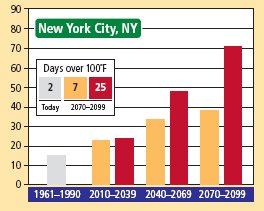Northeastern U.S. at risk from global warming
Northeastern U.S. at risk from global warming
mongabay.com
October 4, 2006
A new report warns that global warming will “substantially change” the climate in the northeastern if greenhouse gas emissions not are reduced.
The report, by the Northeast Climate Impacts Assessment (NECIA) — a collaboration between the Union of Concerned Scientists (UCS) and a team of independent scientists from American universities, says that “the Northeast can expect dramatic temperature increases and other climate changes over the course of this century” if emissions are not significantly curtailed. It says that under a high emissions scenario, Northeastern cities will experience an increased number of “extreme heat days” characterized by temperatures over 90°F, a 50 percent reduction in the number of days with snow on the ground, increased droughts, and stronger storms.
 The above figure shows the projected days over 100 F in New York City. Courtesy of the Northeast Climate Impacts Assessment. |
“The very notion of the Northeast as we know it is at stake,” said Dr. Cameron Wake, Research Associate Professor at the University of New Hampshire’s Climate Change Research Center and co-lead author of the report. “The near-term emissions choices we make in the Northeast and throughout the world will help determine the climate and quality of life our children and grandchildren experience.”
The report says that the impact of global warming will be less dramatic under a lower emissions scenario where carbon dioxide emissions are reduced by 3 percent each year.
“The Northeast’s economy and lifestyle is built around the seasonal cycles—pleasant summers, winter recreational opportunities, and iconic fall foliage,” said report co-lead Katharine Hayhoe, Research Associate Professor in the Dept. of Geosciences at Texas Tech University. “Fortunately, the worst consequences of global warming can be avoided by reducing our emissions starting today.”
“Lowering emissions provides a tremendous opportunity for the Northeast,” said Dr. Peter Frumhoff, Director of the Global Environment Program at UCS and Chair of the NECIA synthesis team. “We can use our intellectual capital to lead the world in innovative technologies and practices that we will all need to leave a healthy climate for future generations.”
This article is based on a news release from the Northeast Climate Impacts Assessment.
.